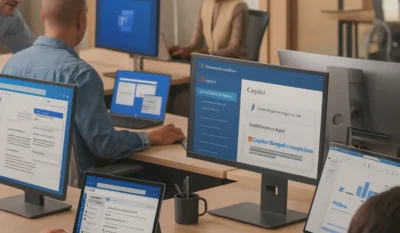Even a brief disruption can derail your operations, damage customer trust, and put your business at risk. Whether it’s cyberattacks, natural disasters, or supply chain disruptions, small and medium-sized businesses (SMBs) must be prepared to face these challenges. Large enterprises lose around $9,000 per minute during downtime, totaling over $500,000 per hour. While your business may not face losses of that scale, the stakes are equally high when it comes to protecting your livelihood.
A strong business continuity plan (BCP) isn’t just insurance; it’s your company’s lifeline. With reliable backups and clearly defined recovery objectives, a solid BCP helps your business recover fast, keeping things running and customers happy.
This article shows you exactly how to build an effective BCP, protect your critical functions, and secure your business’s future. Read on to learn actionable steps and insights that you can’t afford to miss.
Key takeaways
- If you haven’t defined recovery time objectives for every critical function, your business is still vulnerable to data loss even with cloud backups in place. A vague backup strategy without specific recovery metrics can leave your operations paralyzed longer than you expect.
- Every disruption, whether a cyberattack, power outage, or pandemic, should be viewed as a customer experience issue, not just an operational setback. Customers won’t care why you’re offline; they only notice when you’re not responsive.
- Annual BCP testing isn’t a checkbox; it’s your only chance to discover blind spots before a real disaster strikes. Run full-team simulations to pressure-test your systems, vendors, and staff coordination in advance.
- A well-documented BCP can do more than prevent downtime; it can help you win contracts, meet compliance requirements, and stand out in risk-sensitive industries. Don’t treat continuity planning as overhead when it can drive new revenue.
- The most expensive kind of data loss is the kind you never know happened until it’s too late. Proactively monitor backup integrity and validate recovery workflows regularly, not just after a scare.
What is business continuity planning?
If you’ve ever worried about how your business would survive a serious disruption, you’re not alone. Business continuity planning (BCP) provides confidence that your most critical business operations will continue or recover quickly in the event of an unexpected occurrence. Whether you’re facing cyber threats, natural disasters, or internal system failures, a well-designed business continuity plan provides the clarity and control you need to move forward confidently.
A strong BCP connects more than just your IT systems. It connects every part of your organization, from people and data to communication and vendor coordination. When designed well, it helps you minimize downtime, maintain customer trust, and keep your team focused and productive.
Here’s what a comprehensive BCP typically includes:
- Risk assessment: Identify potential threats and evaluate vulnerabilities that could affect your business.
- Business Impact Analysis (BIA): Understand how disruptions could affect your essential operations and revenue.
- Recovery strategies: Outline step-by-step methods for quickly restoring your most critical business functions.
- Disaster recovery plan (DRP): Define your data backup and data recovery solutions, particularly for your IT systems and cloud storage.
- Communication Plan: Ensure you can effectively reach internal stakeholders, customers, and vendors during a crisis.
- Regular testing and updates: Keep your plan sharp, tested, and ready for action as your business evolves.
With cyberattacks on the rise and environmental threats becoming more unpredictable, business continuity planning is essential. FEMA reports that 40% of small businesses never reopen after a natural disaster. Your business doesn’t have to be one of them.
Why SMBs can’t afford to delay business continuity planning
Planning is a survival strategy. As a small or medium-sized business, your margins may be tight, your team may be lean, and your time may be limited. But that’s precisely why a business continuity plan matters.
You’re more financially exposed.
Unlike large corporations, SMBs often don’t have the luxury of deep cash reserves or backup systems. A single prolonged disruption can have ripple effects that last for months. According to FEMA, over 90% of businesses that experience more than a week of downtime close within a year. A well-executed BCP helps you avoid those devastating financial losses by restoring your operations quickly.
Cybersecurity risks are growing.
Ransomware and phishing attacks on SMBs are on the rise, with Verizon reporting over 12,000 confirmed breaches last year. Without a BCP that integrates strong cybersecurity measures, your business is an easy target. Including recovery solutions as part of your continuity strategy protects both your data and your reputation.
Regulatory requirements demand it.
If you operate in a regulated industry, such as healthcare, finance, or retail, you may already be required to have a documented business continuity plan in place.
Compliance frameworks such as the Health Insurance Portability and Accountability Act (HIPAA), the Payment Card Industry Data Security Standard (PCI DSS), and the Cybersecurity Maturity Model Certification (CMMC) emphasize continuity, data protection, and disaster recovery planning.
A strong BCP helps you stay compliant while protecting your business.
Customer expectations are higher than ever.
Customers don’t pause their expectations when something goes wrong behind the scenes. They expect fast, reliable service, no matter what. Your business continuity plan helps meet those expectations, even when challenges arise.
The longer you wait, the greater the risk. Every day without a plan leaves you vulnerable.
How SMBs can build a strong business continuity plan
Building a business continuity plan doesn’t have to be overwhelming. With the right approach, you can create a powerful tool that helps your business stay resilient, responsive, and ready.
1. Conduct a risk and impact assessment
Start by identifying the threats most likely to affect your business, such as cyberattacks, natural disasters, human error, power outages, or supply chain disruptions. Once you’ve identified potential threats, perform a business impact analysis (BIA) to understand the effect of each scenario. Which business functions take the hardest hit when disaster strikes? How long could you function without them?
2. Identify critical systems and processes
Focus on the systems, people, and business functions that are essential to your daily operations. Consider:
- Payroll and HR systems
- Customer service and communication tools
- IT infrastructure and software platforms
- Inventory and supply chain tools
Knowing what’s most important helps you prioritize recovery strategies.
3. Create a data backup and disaster recovery strategy
Reliable backup solutions are the backbone of any BCP. Utilize secure, cloud-based tools to back up essential data automatically. Build a disaster recovery plan that includes recovery time objectives (RTOs), which are the maximum amount of time each system can be down before it seriously impacts your business. This helps you prioritize which systems to restore first. Ensure your plan encompasses both data recovery and continuity for your entire IT infrastructure.
4. Develop communication and vendor coordination plans
When disaster strikes, communication is everything. Create a communication plan that covers how you’ll notify staff, reach vendors, and support customers. Don’t forget to:
- Designate communication leads for internal and external updates
- Keep contact information current and accessible
- Identify alternative vendors or supply chain options
5. Test and update the plan regularly
You need to revisit and refine your BCP regularly. Regular testing and updates ensure it works when you need it most. Run simulated disruption scenarios and include staff in training exercises to prepare for potential emergencies. Document any lessons learned and make updates as your business grows or changes.
6. Work with a trusted partner
You don’t have to build your BCP alone. Keystone Technology Consultants offers hands-on experience helping SMBs design, manage, and refine continuity strategies. They work closely with your team to ensure the plan aligns with your goals, industry, and budget.
Having a business continuity plan is no longer a “nice to have.” It’s a core part of protecting your operations, your people, and your future.
Why SMBs choose Keystone Technology Consultants for BCP
When disaster strikes, you need more than hope; you need a plan. Keystone Technology Consultants brings over 25 years of hands-on experience helping SMBs prepare for the unexpected. Their local team knows the real-world risks business owners face and delivers practical, budget-conscious business continuity solutions that work when it counts.
Keystone’s approach is grounded in genuine partnership. They work directly with your stakeholders to tailor every continuity plan to your operations, focus on your most critical systems, and safeguard your bottom line from avoidable financial losses. They cover every detail, from data backup and cybersecurity to recovery strategies and compliance, so you can stay operational through any challenge.
If you’re serious about keeping your business resilient and prepared, don’t wait for disaster to force your hand.
Reach out to Keystone today and build a plan that protects your future
FAQs
What’s the difference between a business continuity plan and a disaster recovery plan?
A business continuity plan outlines how your business will maintain operations during a disruption, covering people, processes, and systems. In contrast, a disaster recovery plan specifically focuses on restoring the IT infrastructure and data after a disaster has occurred.
How often should we test our business continuity plan?
You should test your BCP at least annually, or more frequently if your business undergoes significant changes or faces new potential threats.
Can SMBs afford comprehensive BCP solutions?
Yes. Keystone tailors continuity solutions specifically for SMB budgets, ensuring comprehensive protection without overstretching resources.




